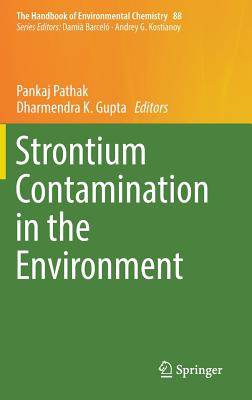Heavy Metal Toxicity: Environmental Concerns, Remediation and Opportunities
Singh, Rajeev Pratap, Singh, Pooja, Srivastava, Amrita
- 出版商: Springer
- 出版日期: 2024-09-24
- 售價: $7,700
- 貴賓價: 9.5 折 $7,315
- 語言: 英文
- 頁數: 440
- 裝訂: Quality Paper - also called trade paper
- ISBN: 9819903998
- ISBN-13: 9789819903993
海外代購書籍(需單獨結帳)
相關主題
商品描述
This contributed volume covers a comprehensive account of the sources, toxic biological as well as environmental impacts, and possible remediation strategies for contamination by heavy metals. In biological systems, toxic metals affect the integrity of cellular organelles and act as carcinogens causing chromosomal aberrations or as systemic toxicants leading to cardiovascular, neurobehavioral, and immunological disorders. In plants, they interfere with photosynthesis, fertility, metabolite, and chlorophyll synthesis. Toxicity induced by heavy metals involves mechanistic approaches that need to be understood properly. They cannot be degraded by biological or chemical means and thus can only be converted to less harmful forms. The conventional detection methods include biosensors, voltammetry, atomic absorption spectrometry, and inductively coupled plasma with atomic emission spectrometry. All such strategies for metal detection and mitigation strategies are covered in this title under one section.
This book incorporates classical views along with modern scientific approaches to develop an understanding of the subject matter suitable for academicians, researchers, planners, policymakers, NGOs, and environmental consultancies and raise awareness on this concern. Topics representing diverse sections namely environmental impacts, biological effects, and methods used for detection and remediation have been included to address all possible contemporary issues on the topic in one concise volume.
商品描述(中文翻譯)
本書涵蓋了重金屬污染的來源、毒性生物及環境影響,以及可能的修復策略的全面介紹。在生物系統中,毒性金屬會影響細胞器的完整性,並作為致癌物質導致染色體畸變,或作為全身性毒物引發心血管、神經行為及免疫系統疾病。在植物中,它們會干擾光合作用、生育、代謝物及葉綠素的合成。重金屬引起的毒性涉及需要正確理解的機制性方法。這些金屬無法通過生物或化學手段降解,因此只能轉化為較不有害的形式。傳統的檢測方法包括生物感測器、伏安法、原子吸收光譜法及電感耦合等離子體原子發射光譜法。本書在一個章節中涵蓋了所有這些金屬檢測和減緩策略。
本書結合了傳統觀點與現代科學方法,以發展對該主題的理解,適合學術界、研究人員、規劃者、政策制定者、非政府組織及環境顧問,並提高對此問題的認識。書中包含了代表不同領域的主題,如環境影響、生物效應,以及用於檢測和修復的方法,以便在一本簡明的卷冊中解決所有可能的當代問題。
作者簡介
Dr. Rajeev Pratap Singh works in the area of waste management and has worked on various kinds of wastes, i.e., fly ash, sewage sludge, tannery sludge, palm oil mill waste, contaminated water irrigation, etc. He has many publications in reputed journals on waste management and similar topics. He has been honored with several international awards including "Green Talent" Award from the Federal Ministry of Education and Research (BMBF), Germany; Prosper.Net Scopus Young Scientist Award; DST Young Scientist Award; and Water Advanced Research and Innovation (WARI) Fellowship, a fellowship supported by the Department of Science and Technology (DST), Government of India, the Indo-US Science and Technology Forum (IUSSTF), University of Nebraska-Lincoln (UNL), and the Robert Daugherty Water for Food Institute (DWFI). He has coauthored 4 books and more than 40 highly cited research and review articles on solid waste management.
Dr. Amrita Srivastava holds PhD from the Department of Botany, Banaras Hindu University and works at Central University of South Bihar, Gaya. She works in the area of microbial secondary metabolite applications. Her major interest is in the characterization of microbial secondary metabolites called siderophores. Recently, she has started working on heavy metal stress, specifically arsenic and cadmium stress. The focus of her work lies in the extraction and purification of microbial secondary metabolite siderophores and their application for heavy metal mitigation in crops, bioremediation, and various symbiotic/antibiotic interactions mediated by them. This includes antifungal and anticancer properties of siderophore and physiological effects on plants and other microbes. She has published 23 research and review articles in journals of international repute, edited 1 book, and authored over 13 book chapters.
Dr. Pooja Singh holds a PhD from the School of Industrial Technology, University Sains Malaysia, Penang, Malaysia; an MSc (Biotechnology) from Devi Ahilya University, Indore; and an MTech in Biotechnology from Rajiv Gandhi Proudyogiki Vishwavidyalaya, Bhopal, MP. She is currently a faculty member at ICST, SHEPA, Varanasi. Her current research interests include enzymes, biopulping of oil palm biomass, and vermicomposting using various types of wastes. She has published 18 papers in various reputed international journals, 5 book chapters, and 1 edited book.
作者簡介(中文翻譯)
Dr. Rajeev Pratap Singh 在廢物管理領域工作,並且曾研究各種廢物,如飛灰、污水污泥、皮革廠污泥、棕櫚油廠廢物、受污染的水灌溉等。他在廢物管理及相關主題上發表了許多著名期刊的論文。他曾獲得多項國際獎項,包括德國聯邦教育與研究部(BMBF)頒發的「綠色人才」獎、Prosper.Net Scopus 年輕科學家獎、DST 年輕科學家獎,以及水資源先進研究與創新(WARI)獎學金,該獎學金由印度政府科學與技術部(DST)、印美科學與技術論壇(IUSSTF)、內布拉斯加-林肯大學(UNL)及羅伯特·道赫提食品水資源研究所(DWFI)支持。他共同撰寫了四本書籍,並發表了超過四十篇被高度引用的固體廢物管理研究與評論文章。
Dr. Amrita Srivastava 擁有班納拉斯印度大學植物學系的博士學位,目前在南比哈爾中央大學工作。她的研究領域為微生物次級代謝物的應用,主要關注於微生物次級代謝物——鐵載體的特徵化。最近,她開始研究重金屬壓力,特別是砷和鎘的影響。她的研究重點在於提取和純化微生物次級代謝物鐵載體,並應用於作物的重金屬減緩、生物修復及其介導的各種共生/抗生素相互作用,包括鐵載體的抗真菌和抗癌特性,以及對植物和其他微生物的生理影響。她在國際知名期刊上發表了23篇研究和評論文章,編輯了一本書籍,並撰寫了超過13個書章。
Dr. Pooja Singh 擁有馬來西亞檳城的馬來西亞科學大學工業技術學院的博士學位,印度奧爾多爾的德維·阿希利亞大學的生物技術碩士學位,以及印度博帕爾的拉吉夫·甘地技術大學的生物技術碩士技術學位。她目前是瓦拉納西ICST, SHEPA的教職員。她目前的研究興趣包括酶、油棕生物質的生物製漿,以及利用各種廢物進行蚯蚓堆肥。她在多個著名國際期刊上發表了18篇論文,5個書章,以及1本編輯書籍。











